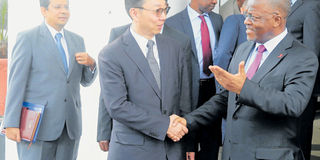IMF: How Tanzania can attain Vision 2025

What you need to know:
Delivering a public speech at the Bank of Tanzania Conference Hall in the city Mr Tao, who is currently vising the country, said increasing investments in the infrastructure development, strengthening the role of the private sector and creating inclusive growth through better access to education, health and finance as some of the things the government could do to fast-track its way to the middle-income status.
Dar es Salaam. The Deputy Director of the International Monetary Fund, Mr Tao Zhang, yesterday detailed how Tanzania can achieve its long desired goal of becoming a middle-income economy by 2025.
Delivering a public speech at the Bank of Tanzania Conference Hall in the city Mr Tao, who is currently vising the country, said increasing investments in the infrastructure development, strengthening the role of the private sector and creating inclusive growth through better access to education, health and finance as some of the things the government could do to fast-track its way to the middle-income status.
Relying on local resources
Building infrastructure and creating a sizeable industrial base should rely on local resources mobilised from the private and public sectors within the country.
This could be done by strengthening revenue collection systems and creating a fair and predictable tax regime. He noted that this is the area where Tanzania has fallen behind its neighbors. But added that setting up public private partnerships and expanding the reach of the banking system to mobilise more savings could also help in increasing domestic resources.
“Past experience has shown that it is always important to maintain debt sustainability and to contain government dependence on foreign capital,” he said at the public lecture attended by senior Bank of Tanzania officials and other government technocrats from both the Mainland and Zanzibar.
Strong institutions
Improvements in public investment management can only take place if strong institutions are in place. And this is necessary for efficient use of public resources.
“This means strong institutions to manage and monitor projects with the goal of ensuring maximum value for the money. Tanzania has taken steps in this area, but much more progress is needed,” Mr Tao noted, adding; “Tanzania has taken steps in this area, but much more progress is needed.”
According to him, strong institutions are important if corruption is to be maintained and taxes paid.
“I understand this is a sensitive topic in any country. But I think all of us also understand how bribery and failure to pay taxes can drain the vitality from any economy,” he said.
He added; “That is why we welcome President [John] Magufuli’s strong drive against corruption and tax evasion. This signals the government’s firm commitment to a development path that benefits all Tanzanians.”
Improving business climate
Improving the business climate for local and foreign businesses is another area Tanzania could work on to grow the industrial base.
According to Mr Tao, the government has a key role to play providing stable policy and regulatory frameworks for development.
However he said that it is ultimately the private sector that is the engine for growth and creating employment.
“A strong private sector can foster economic diversification, expand trade and deepen Tanzania’s integration into global value chains.
In view of this, he called on the government to exercise transparency in its decision making, eliminate red tapes, create a fair judicial system and consult private sector on planned reforms.
Regional trade
Facilitating regional trade could go a long way to provide a reliable market for industrial and other products. But deepening regional integration must go hand in hand with working on issues such as non-tariff barriers, rules of origin, tax administration and harmonisation, automation of trade procedures and labor mobility.
“The East African Community is an ambitious project can encourage the dynamism of over 150 million people across East Africa. It opens the door to expanded trade and investment,” Mr Tao noted.
Tackling poverty
Lastly he emphasised on the need to tackle poverty through providing jobs to the youth and improving the health and education sectors because “a growing labour force must be healthy and well educated.”
He noted that a large number of young people remain unemployed or underemployed which poses a big challenge. Finding a solution to youth unemployment is crucial taking into consideration the fact that by 2035, half of the people entering the global labor market will be from sub Saharan Africa.
In retrospect the Africa’s growing population could benefit the Continent emerge as a source of growth for the global economy in the coming decades




